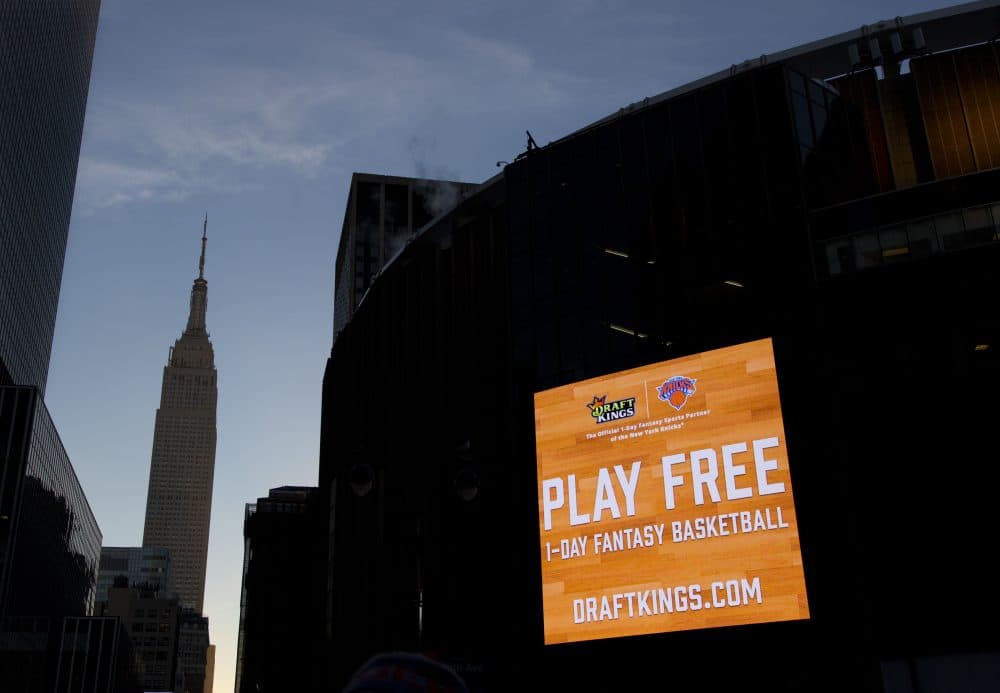Advertisement
Former Fantasy Sports Highroller Takes A Step Back

Not so long ago, it was impossible to watch sports — or almost anything else — on TV without hearing a lot of ads for FanDuel and DraftKings. Those two companies — and others — invited fans to bet on fantasy lineups composed of actual players whose actual statistics would determine how well those fantasy teams performed.
Last year, NFL owners Jerry Jones and Robert Kraft were among the many high rollers bankrolling the enterprise. But according to a recent ESPN story, the companies are now half the size they were then.
In part that’s because in some states, the game they offer has been characterized as illegal gambling rather than a legal endeavor based on skill. The distinction probably didn’t matter to lots of the players.
"There are people that are gonna throw their $3 in just for the entertainment," says John Sullivan, who's personal story may shed some light on what’s happened to the industry. "It’s like holding a lottery ticket while you watch the balls come out of the hopper. In gambling nomenclature, that’s called a sweat."
Ten years ago, Sullivan started playing daily fantasy sports because he felt he’d be better than lots of other people at figuring out who might play well on any given Sunday. Still, he was careful.
"I’m a pretty skeptical guy, so I played very small dollar amounts in the beginning," Sullivan says.
Putting together fantasy lineups made watching the actual players in the actual games more interesting. It was fun, and then one day it became lucrative:
"During football season, which is like the Christmas shopping season of daily fantasy — that’s when they have the most users and the most engagement — I played about 30 contests, which was a lot for me back then. That was the first day — it was just Sunday, a Sunday football day — where I made over $1,000 in one day. That was a tipping point for me. That was where it went from just a social activity to: 'This could be a job for me.'"
The job eventually expanded to include a more certain revenue stream. As an “affiliate marketer,” Sullivan recruited other players for the fantasy gaming websites.
"Every player that you sign up to the site, you get a small percentage of the money that they spend on the site," Sullivan explains.
Advertisement
He handed out business cards at sporting events in Buffalo, inviting people to sign up. Those who did got weekly lineups in their inboxes. Sullivan made a little more extra money consulting for the websites, telling them how he thought they might make what they had to offer more attractive to gamblers (sorry, players).
"I was one of the better players in the beginning, and around 2011, I think, I had my best day ever. I won three tournaments on an NFL Sunday on FanDuel, and I made about 12 grand in one day, and to me that was a lot of money," Sullivan recalls. "This is what actually went through my head: ‘Will I be able to do this again?’"
Um, no. Sullivan, who played under the name Buffalo66, never did have another day like that. And then…
"Over a period of years, I would say from 2013 to 2015, the industry went away from what I enjoyed about it, but ultimately the decision was made for me when New York outlawed daily fantasy."
By that point, the product had changed. Thousands of players were competing against each other, and, unbeknownst to the majority, a few of those players were exceptionally well prepared.
"Ninety percent of the players are pretty much being led to slaughter here. Most people don’t really know how advanced the best players are these days.”
John Sullivan
"They’re data scientists, they’re people that have advanced degrees and the sites are slowly getting better at doing things about it, but it’s still 90 percent of the players are pretty much being led to slaughter here," Sullivan says. "Most people don’t really know how advanced the best players are these days."
Sullivan also noticed that the sites had begun taking a bigger cut of the money being bet, and he asked himself a basic question:
"Am I getting a fair game when I play?"
Sullivan didn’t think so. So he pulled back. He still creates fantasy lineups for games in the Canadian Football League, just for the fun of it. He gives them away. And he still collects a commission for the players he steered toward the sites. But he’s also speaking out about the preposterous odds against beating this particular game.
So what would happen if one of those people to whom he’d handed his business card on a snowy day at New Era Field in Buffalo called him up and asked him how to sign up? Because as of this week, it’s legal again to do that in New York.
"The first thing I would say to him is, ‘Have you played daily fantasy sports before?’" Sullivan says.
If not, Sullivan would point the aspiring player to sources of information about how much the house makes on each bet and about the sharks he or she would be playing against, though he wouldn’t necessarily tell the player not to play.
"I feel like, if this is an activity you want to participate in, you’re a grown-up, and you can do that," Sullivan says.
If you’re a grown-up — or even a kid — who wants to know a lot more about the rise and the apparent fall of the daily fantasy sports industry, check out Don Van Natta’s ESPN article titled “Welcome to the Big Time.”
This segment aired on August 27, 2016.
